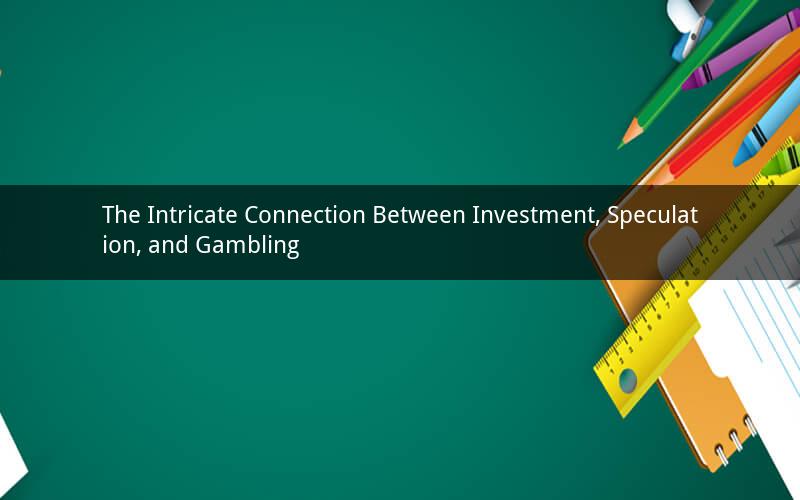
Investment, speculation, and gambling are often seen as distinct activities, each with its own set of rules and objectives. However, these three concepts are more closely related than one might think. This article explores the intricate connection between investment, speculation, and gambling, highlighting the similarities and differences between them.
Investment is the act of allocating resources with the expectation of generating an income or profit. It involves purchasing assets such as stocks, bonds, real estate, or other financial instruments with the aim of increasing their value over time. Investors typically have a long-term perspective and are willing to wait for their investments to mature.
Speculation, on the other hand, is the act of buying or selling assets with the expectation of making a profit from short-term price fluctuations. Speculators are more focused on the short-term market trends and are willing to take on higher risks in exchange for potentially higher returns. Unlike investors, speculators do not necessarily have a long-term perspective and may exit their positions quickly.
Gambling, as we all know, is the act of betting on an uncertain event with the hope of winning money. It is characterized by its inherent risk and the element of chance. Gamblers are driven by the thrill of the game and the possibility of winning big, often at the expense of losing more.
Despite their differences, investment, speculation, and gambling share several key similarities:
1. Risk and Reward: All three activities involve taking risks in the hope of generating a profit. The level of risk can vary, but the potential for high returns is a common denominator.
2. Uncertainty: Investment, speculation, and gambling all involve uncertainty. Investors may not know when their investments will mature, speculators may not know when the market will turn, and gamblers may not know the outcome of their bets.
3. Time Horizon: While investors typically have a long-term perspective, speculators and gamblers are more focused on the short term. However, even investors may engage in speculative behavior at times.
4. Emotions: Emotions can play a significant role in all three activities. Investors may become overly optimistic or pessimistic, speculators may become greedy or fearful, and gamblers may become addicted to the thrill of winning.
Despite these similarities, there are distinct differences between investment, speculation, and gambling:
1. Objectives: Investors aim to generate long-term wealth, speculators seek short-term profits, and gamblers are driven by the thrill of the game.
2. Risk Tolerance: Investors typically have a higher risk tolerance than speculators, who, in turn, have a higher risk tolerance than gamblers.
3. Knowledge and Experience: Investment and speculation require a certain level of knowledge and experience, while gambling is often based on luck and chance.
4. Regulation: Investment and speculation are subject to various regulations, while gambling is often unregulated or heavily regulated depending on the jurisdiction.
Now, let's delve deeper into the relationship between investment, speculation, and gambling:
1. The Role of Speculation in Investment: Speculation can play a role in investment by providing liquidity and driving market efficiency. When speculators buy and sell assets, they help to determine their fair value, which can benefit long-term investors. However, excessive speculation can lead to market volatility and bubbles.
2. The Role of Investment in Speculation: Investment can provide a foundation for speculation. By investing in a particular asset, speculators can gain exposure to the market and potentially profit from short-term price fluctuations.
3. The Role of Gambling in Speculation: Gamblers can contribute to speculation by driving up demand for certain assets. However, their lack of knowledge and experience can lead to irrational behavior, which can negatively impact the market.
4. The Role of Speculation in Gambling: Speculation can provide gamblers with a sense of control over their destiny. By engaging in speculative activities, gamblers may feel like they are making informed decisions, even though the outcome is still uncertain.
In conclusion, investment, speculation, and gambling are interconnected concepts that share similarities and differences. While they all involve risk and the potential for profit, their objectives, risk tolerance, and time horizons vary. Understanding the relationship between these three activities can help individuals make more informed decisions and avoid falling into the trap of excessive risk-taking.
Here are five questions related to the topic:
1. How can speculation benefit long-term investors?
Answer: Speculation can benefit long-term investors by providing liquidity and driving market efficiency. When speculators buy and sell assets, they help to determine their fair value, which can benefit long-term investors.
2. What are the risks associated with engaging in speculative activities?
Answer: The risks associated with speculative activities include market volatility, potential losses, and the possibility of becoming addicted to the thrill of winning.
3. How can investment and speculation be used to hedge against market risks?
Answer: Investment and speculation can be used to hedge against market risks by diversifying one's portfolio. By investing in a variety of assets, investors can reduce their exposure to specific market risks.
4. What are the key differences between investment and gambling?
Answer: The key differences between investment and gambling are their objectives, risk tolerance, and time horizon. Investors aim to generate long-term wealth, have a higher risk tolerance, and focus on the long term, while gamblers are driven by the thrill of the game, have a lower risk tolerance, and focus on the short term.
5. How can individuals avoid falling into the trap of excessive risk-taking in investment, speculation, and gambling?
Answer: Individuals can avoid falling into the trap of excessive risk-taking by setting clear financial goals, diversifying their portfolios, educating themselves on the markets, and maintaining a disciplined approach to their investments. It is also important to be aware of the psychological factors that can lead to irrational decision-making.